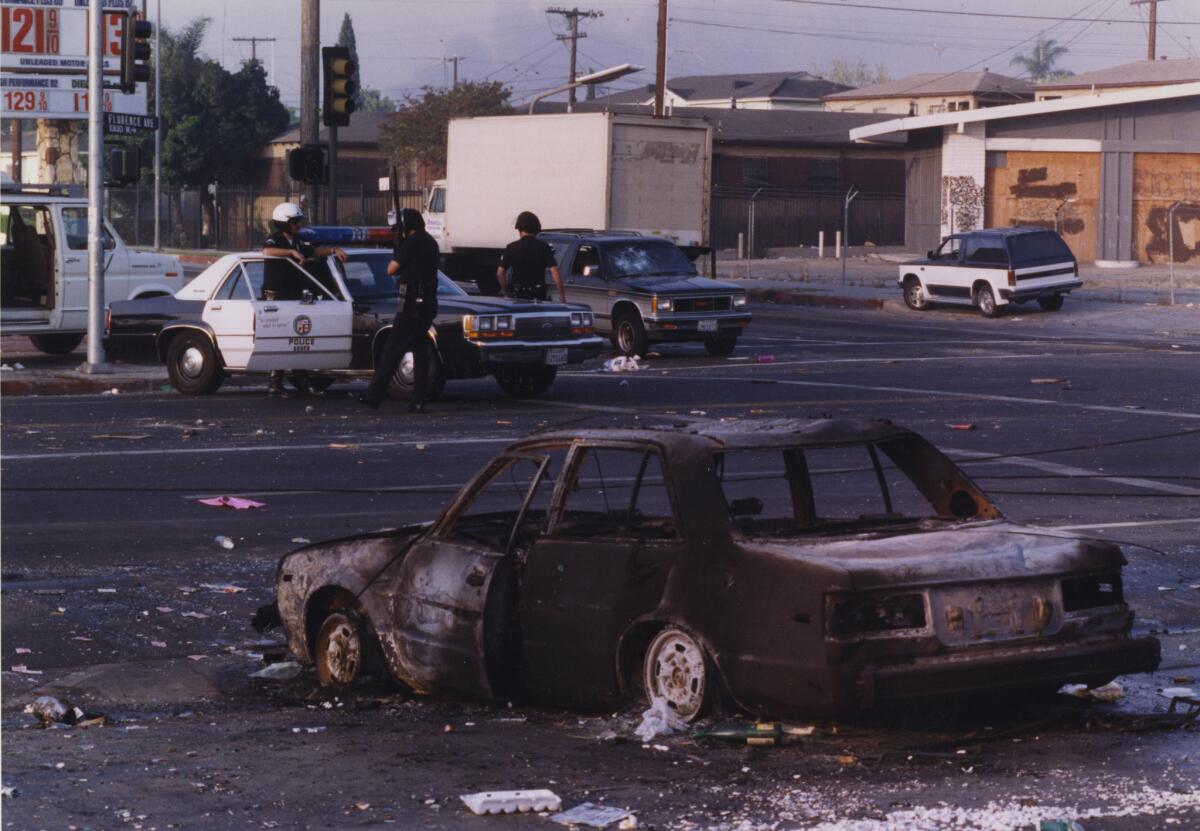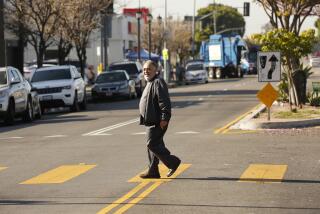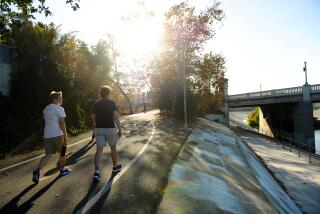Most L.A. residents believe riots unlikely to recur, poll finds

A burned-out car is seen at the intersection of Florence and Normandie on April 29, 1992.
To Rodney King’s now-famous question, “Can we all get along?” Los Angeles residents increasingly answer something like: “Probably. Sort of.”
According to recent surveys by Loyola Marymount University, most Los Angeles residents say that the kind of riots that enveloped the city in 1992 will not occur in the coming years.
------------
FOR THE RECORD:
Survey on riots: An article in the May 4 California section about a survey that found that most Angelenos don’t expect riots such as those in 1992 to occur again soon said that the survey would be released Friday. It was released May 1. —
------------
This is in part because Los Angeles law enforcement has improved and in part because the city has seen the damage that riots can produce, experts say.
The findings by researchers at the university’s Center for the Study of Los Angeles follow a trend beginning in 1997 which shows that a declining percentage of people think that a riot will occur in the next five years.
In 1997, 64.2% of polled adult Los Angeles residents thought it “very likely” or “somewhat likely” that a riot would occur in Los Angeles in the next five years. That percentage has declined in each of the four polls conducted since then. In 2015, 43.8% of residents polled thought a riot was at least somewhat likely.
Meanwhile, the percentage of polled residents who thought it “very unlikely” or “somewhat unlikely” that such unrest would break out has been growing, from 35.7% in 1997 to 56.2% in 2015.
“Residents are getting more confident that a riot will not happen,” said Brianne Gilbert, associate director for the Center for the Study of Los Angeles. “In the city of Los Angeles, they know what the devastation can do.”
The latest survey, to be released Friday, queried 1,202 adult Los Angeles residents earlier this year. Researchers said the growing confidence was partly a result of police reform and the passage of time.
The results come as Baltimore struggles with the unrest that broke out after a funeral Monday for Freddie Gray, a black man who died of a severed spine sustained while in police custody.
They also come as Los Angeles marks 23 years since riots broke out after the acquittal of police officers in the King beating, leaving 53 dead. This year, the city will mark a half-century passed since the Watts Riots of 1965.
Broken down by race, this year’s survey showed that Asian residents were the most likely to think Los Angeles would experience widespread rioting in the next five years, with 53.7% of those polled thinking it was at least somewhat likely.
Of Latinos polled, 45% thought a riot was at least somewhat likely. White residents were the most optimistic, with 39.6% saying that a riot was likely, closely followed by 41.3% of black residents who said the same.
The survey also queried residents on race relations, with 82.4% of Angelenos saying that race relations have either stayed the same or improved over the last four years — compared to 17.6% who said they had gotten worse.
This echoes similar sentiments reported in a USC Dornsife/Los Angeles Times statewide poll released last month in which nearly three-quarters of respondents said race relations were excellent or good in their neighborhood — though an overwhelming majority say that African Americans and Latinos still face significant discrimination.
“We have passed a threshold where it is just a given that when you say, ‘L.A.,’ you are saying multicultural,” said Fernando Guerra, director of the Center for the Study of Los Angeles. “You are saying positive race relations because there are so many groups here.”
Among the racial groups, black residents who took the Loyola Marymount survey were the most pessimistic in that regard. Of the black residents polled, 37.7% said relations had gotten worse over the last four years, compared with 23.2% of whites, 12.5% of Asians and 10.6% of Latinos who said the same.
Guerra said the questions reflected different things: Answers about the possibility of a riot reflected how residents felt about law enforcement, while answers about race relations showed how they viewed their place in society and whether they felt they were moving ahead.
Raphael Sonenshein, executive director of the Pat Brown Institute for Public Affairs at Cal State L.A., said the attitudes of black residents in particular was notable.
As in Baltimore and Ferguson, Mo., the Los Angeles riots began with the controversial police use of force on a man of color. Yet in the recent polls, black Angelenos were less likely than other minority groups to think a riot was likely — even though they were less optimistic about race relations.
Sonenshein said this can be tied to reform of the Los Angeles Police Department after the 1992 riots and the beginnings of civil oversight of the department. Conflict still occurs, but it has not turned to widespread rioting in recent years, as it has in other cities.
“It’s not saying that nirvana has been reached here,” Sonenshein said. “Police reform and civilian oversight don’t make the problems go away, but it makes it possible to deal with them when it happens.”
More to Read
Start your day right
Sign up for Essential California for news, features and recommendations from the L.A. Times and beyond in your inbox six days a week.
You may occasionally receive promotional content from the Los Angeles Times.







